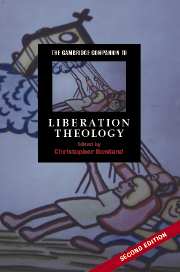Book contents
- Frontmatter
- Introduction: the theology of liberation
- Part I Contemporary Liberation Theology
- 1 The task and content of liberation theology
- 2 ‘Action is the life of all’: the praxis-based epistemology of liberation theology
- 3 Liberation theology in Asia
- 4 Black theology
- 5 Feminist theology: a critical theology of liberation
- 6 Demythologising liberation theology: reflections on power, poverty and sexuality
- Part II Aspects of Liberation Theology
- Part III Analysis and Criticism
- Epilogue: the future of liberation theology
- Select bibliography
- Index
- Series list
6 - Demythologising liberation theology: reflections on power, poverty andsexuality
from Part I - Contemporary Liberation Theology
Published online by Cambridge University Press: 28 January 2008
- Frontmatter
- Introduction: the theology of liberation
- Part I Contemporary Liberation Theology
- 1 The task and content of liberation theology
- 2 ‘Action is the life of all’: the praxis-based epistemology of liberation theology
- 3 Liberation theology in Asia
- 4 Black theology
- 5 Feminist theology: a critical theology of liberation
- 6 Demythologising liberation theology: reflections on power, poverty and sexuality
- Part II Aspects of Liberation Theology
- Part III Analysis and Criticism
- Epilogue: the future of liberation theology
- Select bibliography
- Index
- Series list
Summary
There is no 'right' against the mass of the people! (What we need is) a material world for all, without borders and without frontiers. (What we need is) a common table covered with broad linen; a table that is for everybody like this Eucharist. (What we need are) chairs for everybody.
Fr Rutilio Grande, homily of 13 February 1977. El Salvador. (My italics)The mere existence of socio-sexual activists does not guarantee a radical and profoundly subversive thinking, but it makes it possible, which in itself is no small thing to do.
Susana Rostagnol (2004:43)Chairs for everybody: on inclusivity
Only a few weeks after giving what was going to be his last public homily, FatherRutilio Grande was assassinated by paramilitary troops in his native land, ElSalvador. I am beginning this reflection on liberation theology and sexuality bypaying homage to him and to the many Christian martyrs from Latin America in thetwentieth century, as a way to ground my reflections on Liberation Theology in thetwenty-first century. This is a debt of love and gratitude that we have for thosepioneers who liberated the Gospel in that continent during the difficult politicalclimate of the 1970s.
It is tempting to think that two different projects, theological as well aspolitical, were symbolically confronted in Father Grande’s assassination.One was the project of liberation theology, the project of the alternative Kingdomand integral salvation from private and structural sins such as hunger andpolitical persecution. The other was the hegemonic project from the dictatorialregimes which flourished during the Cold War, which curiously mixed the nationalsecurity doctrine with their own theological discourses.
- Type
- Chapter
- Information
- The Cambridge Companion to Liberation Theology , pp. 123 - 136Publisher: Cambridge University PressPrint publication year: 2007
- 1
- Cited by

